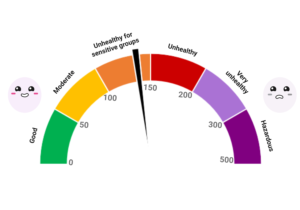“OJOS QUE NO VEN, ¿CORAZÓN QUE NO SIENTE?”*
Is it true that “what the eyes cannot see, the heart cannot feel?”
One of the first things I noticed when I moved from Mexico City, Mexico, to Chapel Hill, NC, was that the air is significantly cleaner, which is why I was surprised when two weeks ago while driving with a friend, I noticed the oh too familiar pollution-related haziness. The smoke from the wildfires in Northern California had traveled all the way to the East Coast!
Although I could physically see something different in the air that day, our eyes do not always perceive this. Thankfully, the Environmental Protection Agency (EPA) established an Air Quality Index (AQI) for the five major air pollutants – ozone, particulate matter (PM2.5), carbon monoxide, sulfur dioxide, and nitrogen dioxide. The AQI scale ranges from 0 to 500 and classifies air quality into five categories ranging from ‘Good’ to ‘Hazardous’. From whichever electronic device you’re reading this on, you can check in real-time the air quality of any place in the world (check out this map). As I’m writing this, the AQI in Chapel Hill is 23, which means that the air quality is ‘Good’. However, due to the current wildfires, the air quality in Westwood, CA, is ‘Hazardous’, with an AQI of 431; its levels of PM2.5 are 39 times above the WHO exposure recommendation!

Air pollution has been a public concern since Roman times. By now, scientists have shown that breathing polluted air contributes to various lung diseases, such as asthma, emphysema, chronic obstructive pulmonary disease (COPD), and lung cancer. This makes sense; after all, the lungs inhale between 2,100 and 2,400 gallons (8,000 to 9,000 liters) of air every day. But the lungs are not the only organs affected. Long-term exposure to fine particulate matter and nitrogen oxides prematurely ages blood vessels (that expensive face serum is doing nothing for your insides) and accelerates atherosclerotic plaque formation, increasing the risk for cardiovascular events, such as heart attacks and strokes. Together, the respiratory and cardiovascular diseases associated with air pollution are responsible for seven million premature deaths every year worldwide. Additionally, long-term exposure to air pollution has been associated with cognitive impairment, dementia, and Alzheimer’s. As if this was not enough, increasing scientific evidence shows that air pollution also affects our immune response to viral infections. A previous study observed that air pollution is related to the severity of COVID-19.
The quality of the air we breathe determines our health and that of every species on the planet; ignoring it is dangerous. So, what can we do to protect ourselves from the pollution surrounding us? First, remember that knowledge is power. Follow the health recommendations for the corresponding AQI in your area. For example, if the air quality is poor, avoid exercising outdoors, stay indoors, and consider buying an air cleaner. Following a Mediterranean diet has also been shown to protect against the adverse effects of some pollutants, as well as fish oil and olive oil supplementation. Inside your home, avoid smoking, burning wood, incense, and candles, and keep your home clean using a wet mop to reduce dust. Ultimately, we need environmental regulations aimed at decreasing the levels of air pollution. Governments and corporations worldwide should be held accountable for their significant contribution to air pollution and the health problems associated with it. Several organizations around the world, such as Union of Concerned Scientists, Coalition for Clean Air, and Little Ninja are actively working on bringing awareness to the public about the health problems related to air pollution, engaging with teachers, scientists, and policymakers to create the change we need.
So contrary to the popular phrase, what the eyes do not see, the heart and other organs can indeed feel.
* Popular phrase used in Mexico to indicate that it is easy to ignore something if you cannot see it. Its equivalent in English would be “Out of sight, out of mind”.
Peer Editor: Katie Acken
Such a beautiful text, I had never thought about it until now. Thanks for the interesting discussion.
Great one for showing your experience and knowledge